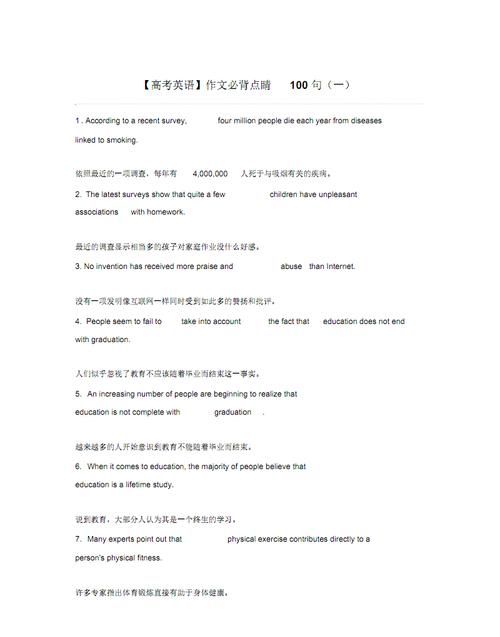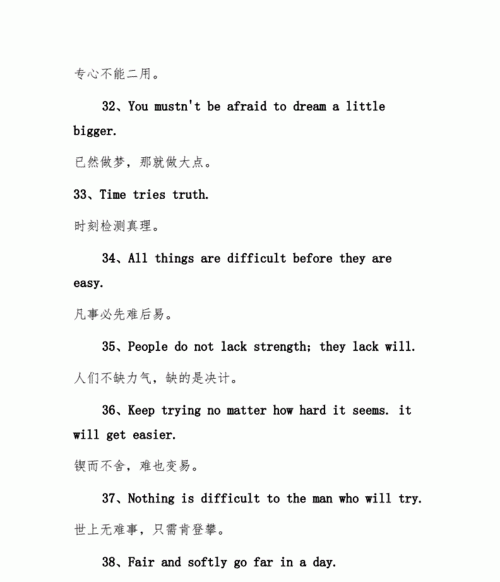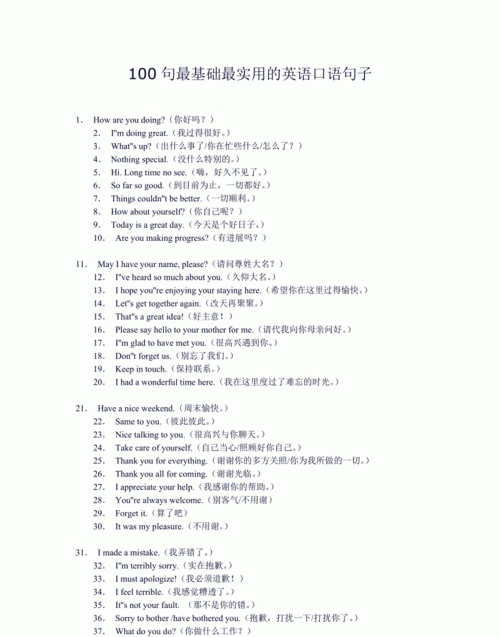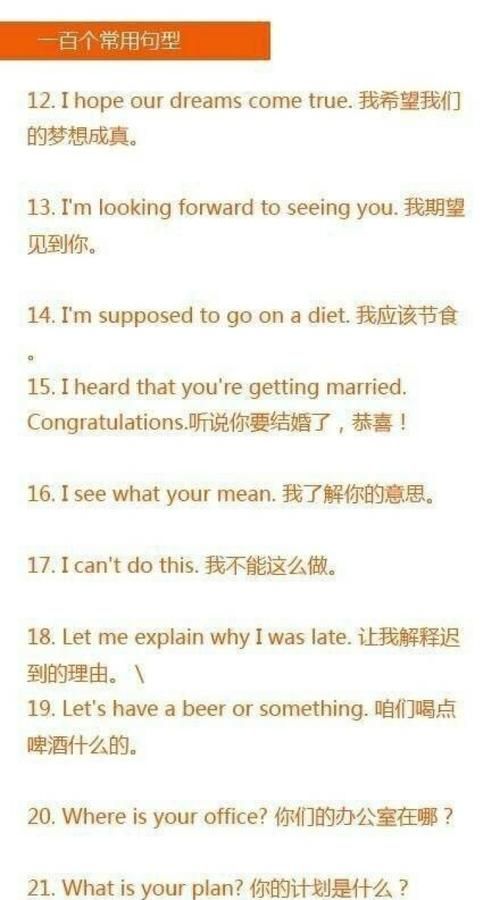本文目录
幼儿日常生活英语短句
1. How are you doing?(你好吗?)
2. I'm doing great.(我过得很好。)
3. What's up?(出什么事了/你在忙些什么/怎么了?)
4. Nothing special.(没什么特别的。)
5. Hi. Long time no see.(嗨,好久不见了。)
6. So far so good.(到目前为止,一切都好。)
7. Things couldn't be better.(一切顺利。)
8. How about yourself?(你自己呢?)
9. Today is a great day.(今天是个好日子。)
10. Are you making progress?(有进展吗?)
11. May I have your name, please?(请问尊姓大名?)
12. I've heard so much about you.(久仰大名。)
13. I hope you're enjoying your staying here.(希望你在这里过得愉快。)
14. Let's get together again.(改天再聚聚。)
15. That's a great idea!(好主意!)
16. Please say hello to your mother for me.(请代我向你母亲问好。)
17. I'm glad to have met you.(很高兴遇到你。)
18. Don't forget us.(别忘了我们。)
19. Keep in touch.(保持联系。)
20. I had a wonderful time here.(我在这里度过了难忘的时光。) 21. Have a nice weekend.(周末愉快。)
22. Same to you.(彼此彼此。)
23. Nice talking to you.(很高兴与你聊天。)
24. Take care of yourself.(自己当心/照顾好你自己。)
25. Thank you for everything.(谢谢你的多方关照/你为我所做的一切。)
26. Thank you all for coming.(谢谢光临。)
27. I appreciate your help.(我感谢你的帮助。)
28. You're always welcome.(别客气/不用谢)
29. Forget it.(算了吧)
30. It was my pleasure.(不用谢。)
31. I made a mistake.(我弄错了。)
32. I'm terribly sorry.(实在抱歉。)
33. I must apologize!(我必须道歉!)
34. I feel terrible.(我感觉糟透了。)
35. It's not your fault. (那不是你的错。)
36. Sorry to bother /have bothered you.(抱歉,打扰一下/打扰你了。)
37. What do you do?(你做什么工作?)
38. How do you like your new job?(你觉得你的新工作怎样?)
39. I like it a lot.(我很喜欢。)
40. I like reading and listening to music.(我喜欢阅读和欣赏音乐。)
41. What's wrong?(怎么回事?)
42. What happened?(发生什么事了?)
43. I hope nothing is wrong.(我希望一切顺利。)
44. I know how you feel.(我知道你的感受。)
45. Sorry to hear that.(听到这个消息我很难受。)
46. Come on, you can do that.(来吧,你能做到的。)
47. Use your head.(动动脑筋。)
48. You did a great job.(你赶得很好。)
49. That's very nice of you.(你真好。)
50. I'm very proud of you.(我为你感到自豪。)
51. I like your style.(我喜欢你的风格。)
52. I love you guys.(我爱你们。)
53. How do I look?(我看起来怎么样?)
54. You look great!(你看上去棒极了!)
55?That's fantastic!(那真是棒极了!)
56. That's really something.(那真是了不起!)
57. It's a pleasure working with you.(与您合作很愉快。)
58. Congratulations on you success.(祝贺你的成功。)
59. I'd like to propose a toast.(我提议干杯!)
60. Are you married or single?(你结婚了吗?)
61. I've been dying to see you.(我非常想见到你。)
62. I'm crazy about you.(我为你疯狂/痴迷/神魂颠倒。)
63. I love you with all my heart.(我全心全意爱你!)
64. You're everything to me.(你是我的一切!)
65. You're in love!(你恋爱了!)
66. I'm tired of working all day.(整日工作使我厌烦。)
67. You work too much.(你做得太多了。)
68. Money will come and go.(钱乃身外之物。)
69. Are you crazy?(你疯了吗?)
70. Have you got it?(明白了吗?)
71. I've got it.(我懂了。)
72. I can't afford that.(我承担/买不起。)
73. I did it, I'm so happy now.(我做到了,现在我很满意。)
74. I don't care.(不关我的事/我不管。)
75. I don't think so.(我不这么想/我看不会/不行/不用。)
76. I guess so.(我想是吧。)
77. I have no other choice.(我别无选择。)
78. I will do my best!(我会尽力的!)
79. I mean it.(我是认真的。)
80. I'm so scared.(我怕极了。)
81. It's hard to say.(难说。)
82. It's a long story.(说来话长/一言难尽。)
83. It's a small world.(世界真小。)
84. It's against the law!(那是违法的!)
85. It's a good opportunity!(好机会!)
86. It's dangerous!(危险!)
87. May I help you?(我能帮忙吗?)
88. No doubt about it.(毫无疑问。)
89. That's bullshit!(废话!)
90. Think it over.(仔细考虑一下。)
91. Time will tell.(时间会证明的。)
92. What a surprise!(太令人惊讶了!)
93. Whatever you say!(随便你!)
94. You are the boss!(听你的!你说了算!)
95. You have my word!(我保证!)
96. Tough job, tough day, tough world. Life is not always sweet. That's life!
(艰苦的工作,艰难的日子,不幸的世界。生活并不总是甜蜜的。这就是生活!)
97. I need some sleep.(我需要睡眠。)
98. Take it easy.(别紧张。)
99. Just relax.(放松一下。)
100. Zip your fly!(闭嘴!)

常用的英文句子
1. How are you doing?(你好吗?) 2. I'm doing great.(我过得很好。) 3. What's up?(出什么事了/你在忙些什么/怎么了?) 4. Nothing special.(没什么特别的。) 5. Hi. Long time no see.(嗨,好久不见了。) 6. So far so good.(到目前为止,一切都好。) 7. Things couldn't be better.(一切顺利。) 8. How about yourself?(你自己呢?) 9. Today is a great day.(今天是个好日子。) 10. Are you making progress?(有进展吗?) 11. May I have your name, please?(请问尊姓大名?) 12. I've heard so much about you.(久仰大名。) 13. I hope you're enjoying your staying here.(希望你在这里过得愉快。) 14. Let's get together again.(改天再聚聚。) 15. That's a great idea!(好主意!) 16. Please say hello to your mother for me.(请代我向你母亲问好。) 17. I'm glad to have met you.(很高兴遇到你。) 18. Don't forget us.(别忘了我们。) 19. Keep in touch.(保持联系。) 20. I had a wonderful time here.(我在这里度过了难忘的时光。) 21. Have a nice weekend.(周末愉快。) 22. Same to you.(彼此彼此。) 23. Nice talking to you.(很高兴与你聊天。) 24. Take care of yourself.(自己当心/照顾好你自己。) 25. Thank you for everything.(谢谢你的多方关照/你为我所做的一切。) 26. Thank you all for coming.(谢谢光临。) 27. I appreciate your help.(我感谢你的帮助。)

好句大全比较短的
Back to the endwas not back,into two of the celebration.
回忆走到尽头却不是回忆,便成了两个人的庆典。
Love the life you live, live the life you love. 喜欢自己过
的生活,过自己喜欢的生活。
The perfect boyfriend doesn't drink, smoke, cheat or exist. 完美的男友不喝酒,不抽烟,不欺骗,不存在。
I really wonder why people suddenly change after they get what they wanted. 我真想知道为什么人一旦得到他们想要的,就突然变了。
Almost any situation,good or bad,is affected by the attitude we bring to. 差不多任何一种处境,无论是好是坏,都受到我们对待处境的态度的影响。
`I`d rather love someone I can`t have than have someone I can`t Love. 我宁愿爱上一个我不能拥有的人,也不想拥有一个我无法爱上的人。 We can touch it have no forever, the handle knob fists, there's nothing there, let go, you have is everything. 我们能触摸的东西没有永远,把手握紧,里面什么都没有,把手松开,你拥有的是一切。
Perseverance is not a long race:it is many short races,one after another. 坚持不懈不是一个长跑,而是一个接着一个的短跑!
While there is life there is hope.
一息若存,希望不灭.
I am a slow walker,but I never walk backwards.( America)
我走得很慢,但是我从来不会后退.(亚伯拉罕.林肯美国)
Never underestimate your power to change yourself!
永远不要低估你改变自我的能力!
Nothing is impossible!
没有什么不可能!
Nothing for nothing.
不费力气,一无所得.
The man who has made up his mind to win will never say "impossible ".(Bonaparte Napoleon ,French emperor )
凡是决心取得胜利的人是从来不说“不可能的”.( 法国皇帝 拿破仑.B.)
I will greet this day with love in my heart.
我要用全身心的爱来迎接今天
Do what you say,say what you do
做你说过的,说你能做的
I can make it through the rain.I can stand up once again on my own.
我可以穿越云雨,也可以东山再起(Mariah Carey-through the rain)
All things come to those who wait.
苍天不负有心人
A thousand-li journey is started by taking the first step.
千里之行,始于足下.
Never,never,never,never give up (Winston Churchill)
永远不要、不要、不要、不要放弃.(英国首相 丘吉尔)
A man is not old as long as he is seeking something.A man is not old until regrets take the place of dreams.(J.Barrymore)
只要一个人还有追求,他就没有老.直到后悔取代了梦想,一个人才算老.(巴里摩尔)
You have to believe in yourself .That's the secret of success.(Charles Chaplin ,American actor )
人必须相信自己,这是成功的秘诀.(美国演员 卓别林.C.)
One's real value first lies in to what degree and what sense he set himself.(Einstein Germany)
一个人的真正价值首先决定于他在什么程度上和在什么意义上从自我解放出来.(爱因斯坦 德国)
One thing I know,that is I know nothing.(Socrates Greek)
我所知道的一件事就是我一无所知.(苏格拉底 古希腊)
Cease to struggle and you cease to live.-- Thomas Carlyle
生命不止,奋斗不息.-- 卡莱尔
Victory won't come to me unless I go to it.--
胜利是不会向我们走来的,我必须自己走向胜利.-- 穆尔
We must accept finite disappointment,but we must never lose infinite hope.-- Mattin Luther King
我们必须接受失望,因为它是有限的,但千万不可失去希望,因为它是无穷的.-- 马丁 · 路德 · 金
It's great to be great ,but it's greater to be human.---W.Rogers
成为伟人固然伟大,但成为真正的人更加伟大.
Never give up,Never lose the opportunity to succeed
不放弃就有成功的机会.
Don't try so hard,the best things come when you least expect them to.
不要着急,最好的总会在最不经意的时候出现.
Achievement provides the only real pleasure in life .( Thomas Edison ,American inventor)
有所成就是人生唯一的真正乐趣.( 美国发明家 爱迪生.T.)
Man struggles upwards; water flows downwards.
人往高处走,水往低处流.
Nothing seek,nothing find.
无所求则无所获.
One needs 3 things to be truly happy living in the world:some thing to do,some one to love,some thing to hope for.
在这个世界我们只需拥有三件事便可真正快乐:有自己向往的事业;有自己爱的人;还有希望.
I disapprove of what you say,but I will defend to the death your right to say it.( Voltaire )
我不同意你说的话,但我愿意誓死捍卫你说话的权利.(伏尔泰)
All things in their being are good for something.
天生我才必有用.
Failure is the mother of success.
失败乃成功之母.

英语句子结构分析
越短越好的英语句子:
1. This is a ship.(这是一艘船。)
2. He is an old worker.(他是一个老工人。)
3. I have a brother and a sister.(我有一个兄弟和一个姐妹。)
4. There is a map on the wall.(墙上有一幅地图。)
5. This is a yellow pencil.(这是一支黄铅笔。)
6. Tom is an American boy.(Tom是个美国男孩。)
7. English is a useful tool.(英语是一种有用的工具。)
8. He is telling them an interesting story.(他正在给大家讲一个有趣的故事。)
9. Britain is a European country.(不列颠是一个欧洲国家。)
10. It takes an hour and a half to get there.(这要花费一小时半到达那里。)
11. It is a pig.(它是一头猪。)
12. It is cotton.(它是棉花。)
13. It is wheat.(它是麦子。)
14. It is a cow.(它是一头母牛。)
15. It is an orange.(它是一只橘子。)
16. It is rice.(它是稻子。)
17. It is an ox.(它是一头公牛。)
18. It is a duck.(它是一只鸭子。)
19. It is water.(它是水)
20. It is a hen.(它是一只母牛。)
21. Today is Monday. Tomorrow is Tuesday.(今天是星期一。明天是星期二。)
22. Today is Wednesday. Tomorrow is Thursday.(今天是星期三。明天是星期四。)
23. Today is Friday. Tomorrow is Saturday.(今天是星期五。明天是星期六。)
24. Today is Saturday. Tomorrow is Sunday.(今天是星期六。明天是星期日。)
25. Today is Sunday. Tomorrow is Monday.(今天是星期日。明天是星期一。)
We are workers.(我们是工人。)
26. My sister and I are both pupils.(我的姐妹和我都是学生。)
27. You are all middle school pupils.(你们都是中学生。)
28. They are trees and flowers.(它们是树和花。)
29. Cats and dogs are animals.(猫和狗是动物。)
30. All of them are teachers.(他们都是教师。)
31. The sun is red.(太阳是红色的。)
32. That table is heavy.(那张桌子很重。)
33. I am sixteen.(我十六岁。)
34. Class is over.(课结束了。)
35. The river is faraway.(这条河很远。)
36. Time is up.(时间到了。)
37. The bottle is full of water.(这瓶子装满了水。)
38. I am from Shanghai.(我来自上海。)
39. Comrade Wang is out.(王同志外出了。)
40. The football match is on.(足球比赛开始了。)
41. The boy is over there.(那男孩在那边。)
42. My brother is at home.(我的兄弟在家里。)
43. He is not here.(他不在这里。)
44. She is good at swimming.(她擅长游泳。)
45. I am fond of sports.(我很喜欢运动。)
46. I am tired.(我很累。)
47. You are ill.(你病了。)
48. It is hot today.(今天很热。)
49. The weather is cold.(天气很冷。)
50. It is fine.(这个很好。)
51. The play is good.(这场演出很好。)
52. Snow is white.(雪是白的。)
53. The streets are clean.(街道是干净的。)
54. This hall is full of people.(这个大厅挤满了人。)
55. The library is open.(图书馆开门了。)
56. The film is on.(影片上映了。)
57. My uncle is over there.(我的叔叔在那边。)
58. The cinema is far away.(电影院很远。)
59. The light is off.(灯暗了。)
60. My father is out.(我的父亲外出了。)
61. Her brother is thirteen.(她的兄弟十三岁。)
62. I am eighteen.(我十八岁。)
63. Mr. Smith is from American.(史密斯先生来自美国。)
64. The boys in our class are fond of football.(我们班的男孩很喜欢足球。)
65. Wang Ying is good at music.(王英擅长音乐。)
66.I have a brother.(我有一个兄弟。)
67. He has two English books.(他有两本英语书。)
68. We have a lot of paper.(我们有许多纸。)
69. You have many friends.(你有许多朋友。)
70. My sister has a pen and a ball-pen.(我的姐妹有一支铅笔和一支圆珠笔。)
71. Her classmates have a small library.(她的同班同学们有一个小图书馆。)
72. Our school has twenty classes.(我们的学校有二十个班级。)
73. I have some bread and jam.(我有一些面包和果酱。)
74.There is a teacher’s desk in the classroom.(教室里有一只讲台。)
75. There are forty pupils in the playground.(操场上有四十个学生。)
76. There are some desks and chairs in the office.(办公室里有一些书桌和椅子。)
77. There are two blackboards on the wall.(墙上有两块黑板。)
78. There are four lights in the classroom.(教室里有四盏灯。)
79. There is a loud-speaker in the hall.(大厅里有一只喇叭。)
80. There are two portraits above the blackboard.(黑板上方有两张像。)
81. There is a map and two pictures in the reading-room.(阅览室里有一幅地图和两幅画。)
82.Your pencil is blue. Mine is blue, too.(你的铅笔是蓝色的。我的也是蓝色的。)
83. His book is new. Hers is new, too.(他的书是新的。她的也是新的。)
84. Our classroom is big. Theirs is big, too.(我们的教室很大。他们的也很大。)
85. Her brother is a worker. His is a worker, too.(她的兄弟是一个工人。他的也是一个工人。)
86. Their house is near the park. Ours is near the park, too.(他们的房子在公园附近。我们的也在公园附近。)
87. His room is tidy. Yours is tidy, too.(他的房间很整洁。你的也很整洁。)
88. My sister is not here. Hers is not here, either.(我的妹妹不在这里。她的也不在这里。)
89. Our classroom is not on the first floor. Theirs is not on the first floor, either.(我们的教室不在二楼。他们的也不在二楼。)
90. Your father is not a teacher. Mine is not a teacher, either.(你的父亲不是一个教师。我的也不是一个教师。)
91. Their library is not big. Ours is not big, either.(他们的图书馆不大。我们的也不大。)
92. How nice the song is!(这首歌多么好听啊!)
93. What a wonderful time we’re had!(我们过了一段多么美好的时光啊!)
94. How fast the dog runs!(这只狗跑得多么快啊!)
95. What a clever boy he is!(他是一个多么机灵的男孩啊!)
96. What beautiful music they’re playing!(他们正在演奏多么优美的音乐啊!)
97. How quickly time flies!(时间飞逝得多么快啊!)
98. What an excellent idea you’re got!(你有一个多么出色的主意啊!)
99. What a dear little child he is!(他是一个多么可爱的小孩啊!)
100. He is telling us an interesting story.(他正在给我们讲一个有趣的故事。)
101. We are having a holiday today.(今天我们正在度假。)
102. What are you doing these days?(这几天你正在做什么?)
103. You are speaking so quickly, I can’t understand you.(你这么快地讲着,我没能搞懂你。)
104. Jane’s studying in our school this term. She is preparing her lessons now.(这学期珍妮在我们学校学习。她现在正在准备功课。)
105. Can I use your dictionary for a moment? I’m sorry, but I am using it now.(我能用一下你的词典吗?很抱歉,我现在正在用。)
106. They are doing their best to finish the work in time.(他们正在努力及时完成这项工作。)
107. She is speaking.(她正在讲话。)
108. The children are singing.(孩子们正在唱歌。)
109. I am listening to the radio.(我正在听无线电。)
110. My brother is writing.(我兄弟正在写字。)
111. We are preparing our lesson.(我们正在准备功课。)
112. Our teachers are having a meeting.(我们的老师正在开会。)
113. The dog is running very fast.(狗正在非常快地跑着。)
114. Your sister is looking for her pen.(你的姐妹正在找她的钢笔。)
115. see a map on the wall.(我看见墙上的一张地图。)
116. My father works in a factory.(我的父亲在工厂工作。)
117. The pupils often play games in the playground.(学生们经常在操场上玩游戏。)
118. Tom and his sister often clean the room together in the morning.(汤姆和他的妹妹经常在早晨打扫房间。)
119. She studies politics, Chinese and other subjects.(她学习政治、语文和其他课目。)
120. The boys pass by the bookstore every day on their way to school.(孩子们每天在上学路上经过书店。)
121. My brother and I wash our clothes every day.(我兄弟和我每天洗我们的衣服。)
122. Our parents usually go to work at seven.(我们的父母通常在七点钟去上班。)
123. Birds fly south in winter.(鸟在冬天飞往南方)
124. Mary lives in New York.(玛丽住在纽约。)
125. We always get up early.(我们总是起床很早。)
126. He usually goes to bed at nine.(他通常九点上床。)
127. It often rains in spring.(天天常常下雨。)
128. I sometimes go to the park.(我有时去公园。)
129. She seldom comes late.(她不常迟到。)
130. Li-li never tells a lie.(丽丽从不撒谎。)
131. I often go to the cinema.(我常常去电影院。)
132. He seldom forgets to do his homework.(他不常忘记做回家作业。)
133. The boy usually goes to school at 7.30.(那男孩通常七点半去上学。)
134. She never talks to her teacher that way.(她从不以那种方式跟老师谈话。)
135. He usually studies in the reading-room.(他通常在阅览室里学习。)
136. We always listen to the radio at 8.00 p. m.(我们总是在上午八点听无线电。)
137. John sometimes watches television in the evening.(约翰有时在晚上看电视。)
138. Wang Fang never comes to school late.(王芳来上学从不迟到。)
139. They are always busy.(他们总是很忙。)
140. I don’t usually take a bath at noon.(我通常不在中午洗澡。)
141. Do you often work so late?(你常常工作得这么晚吗?)
142. This is sometimes true.(这有时是真实的。)
143. We can seldom do it without his help.(没有他的帮助,我们很少能做到。)
144. It is not going to be cold next month.(下个月不会马上很冷。)
145. He is always ready to help people.(他总是助人为乐。)
146. You must never do it again.(你千万不能再做这件事。)
147. She is seldom late for school.(她上学不常迟到。)
148. Do you often read the newspaper after supper.(你常常在晚饭后看报吗?)
149. Tom doesn’t usually wake up so early.(汤姆通常不醒得这么早。)
150. Mary can sometimes choose the right thing.(玛丽有时会选择正确的事情。)
151. Does he usually have breakfast at six?(他通常在六点钟吃早饭吗?)
152. The boys are seldom absent from school.(男生们不常缺课。)
153.Now I am reading the newspaper.(现在我正在看报纸。)
154. We are not going to play basket-ball after school.(我们不打算放学后打篮球。)
155. The workers are building a big ship these days.(这几天工人们正在造一条大船。)
156. The pupils are visiting a photo show now.(学生们现在正在参观摄影展览。)
157. We often play basket-ball with Class Three.(我们常常与三班打篮球。)
158. Wang Ling does a lot of housework every evening, but today he is helping his brother with his lessons.(王林每天晚上做许多家务,但今天正在帮助弟弟温习功课。)
159. I am going to study French next year.(我打算明年学法语。)
160. I am going to read the book this morning.(我打算今晚看这本书。)
161. She is going to help her classmate later.(她打算最近帮助她的同学。)
162. It is going to snow very soon.(过不了多久就要下雪了。)
163. We are going to go to Peking the day after tomorrow.(我们打算后天去北京。)
164. You are going to be middle school pupils next autumn.(你们明年秋季就要成为中学生了。)
165. They are going to visit the museum next week.(他们准备下星期参观博物馆。)
166. They are not going to stay here.(他们不打算住在那里。)
167. She is not going to mend her shoes.(她不打算补自己的鞋。)
168. You are not going to have an English lesson tomorrow.(你们没计划明天上英语课。)
169. I am not going to watch TV today.(我不打算今天看电视。)
170. You are not going to see the film next Sunday.(你们不打算下星期天看这部电影。)
171. He is not going to write to his father tonight.(他不打算今晚写信给他父亲。)
172. I shall be at middle school next year.(明年我将要读中学。)
173. You will hear the news tonight.(今夜你将会听到这条消息。)
174. He will tell it to you the day after tomorrow.(他将会在后天把这件事告诉你。)
175. She will play volley ball after school.(放学后她要打排球。)
176. It will be cold tomorrow.(明天要冷了。)
177. The baby will be able to walk soon.(这婴儿不久就能走路了。)
178. We shan’t be middle school pupils next year.(我们不会在明年成为中学生的。)
179. She won’t read the book this evening.(她今晚不会看这本书。)
180. They won’t see the film this week.(他们这星期不会去看这部电影。)
181. You won’t hear from him tonight.(你不会在今夜收到他的信。)
182. I shan’t be sixteen until early next month.(我到下个月月初才十六岁。)
183. They won’t be able to come this evening.(他们今晚不能够来了。)
184. There will be a football match next Sunday.(下星期天将有一场足球赛。)
185. There will be more new machines in the workshop.(车间里将有更多的新机器。)
186. There won’t be any rain next few days.(过几天不会下雨。)
187. There will be several new film on next season.(下个季度会有几部新影片。)
188. We don’t go to school on Sunday.(我们星期天不上学。)
189. He does his homework in the evening.(他在晚上做回家作业。)
190. I first met him on a spring evening.(春天的一个晚上我第一次遇见他。)
191. My sister usually gets up at six o’clock.(我姐姐通常在六点钟起床。)
192. Her father lived in Tientsin at that time.(那时他父亲住在天津。)
193. We have dinner at a quarter to twelve.(我们十一点三刻吃饭。)
194. I left for Peking on September 11.(我是九月十一日赴北京的。)
195. Chang Hua is going to stay here next month.(张华打算下个月在这儿呆着。)
196. We are learning Lesson Ten this week.(这星期我们正在学第十课。)
197. She often works at night.(她常常在夜里工作。)
198. She worked late last night.(她昨夜工作得很晚。)
199. They went to the park the day before yesterday.(前天他们去过公园。)
200. It will be very hot next month.(下个月将会很热。)
100个给100分,300个给300分,200个为何只有150分?开玩笑的。只要能帮到你,给个5分就行了。

以上就是关于一百个简单英语句子 ,幼儿日常生活英语短句的全部内容,以及一百个简单英语句子 的相关内容,希望能够帮到您。
